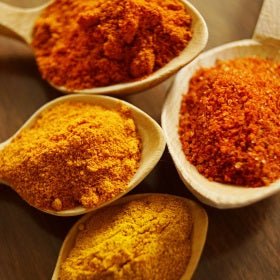As we live longer, there is an increased focus on looking after our cognitive health as we enter old age. This week’s Nutrition News looks at some recent research that suggests that some common nutrients could be the answer to supporting our brains as age.
Find out more here.
Turmeric could support weight management and mental health
Turmeric is known as a powerful anti-inflammatory, however, a recent study, reported by NutraIngredients, has found that it could also support mental wellbeing and weight management.
The study consisted of 90 overweight but otherwise healthy participants between the ages of 50 and 69 who were randomly assigned either turmeric extract or a placebo for 12 weeks. The researchers saw a significant decrease in inflammation markers in the turmeric group after the 12 week period. The turmeric group also experienced statistically significant reductions in body weight compared to the placebo group, suggesting that turmeric could play a role in weight management.
Improvements in mental health scores were also observed, which was measured by the Medical Outcomes Study (MOS) 36-item Short-Form Health Survey (SF-36) and the Profile of Mood States (POMS) Scale.
While further research would be needed to confirm the results, the findings are promising and suggest that a readily available spice could have numerous health benefits in both mental and physical health.
The foods that are rich in zinc
Zinc is a vital mineral that is essential for a range of functions in the body, including cognitive health, fertility, bone health, the support of hair, skin and nails, the function of the immune system, and eye health, among others. Given how important zinc is in order to stay healthy, people are often concerned that they are not getting enough zinc.
This recent video by Healthline suggests some of the top dietary sources of the important mineral.
- Legumes
Legumes such as chickpeas, lentils, and beans all contain substantial amounts of zinc, with lentils containing as much as 12% of the recommended daily amount in a 100g portion.
- Eggs
As well as being a good source of protein, eggs can deliver 5% of the recommended amount of zinc per egg.
- Shellfish
Shellfish, in particular oysters, is a great source of zinc with 6 medium oysters providing a massive 32 mg of zinc.
- Nuts and seeds
In addition to legumes, vegetarians and vegans can consume nuts and seeds as a great, healthy way of boosting zinc intake. Cashews, for example contain 15% of the recommended amount per 28 gram serving.
- Dairy foods
Diary, such as cheese and milk, isn’t just a great way of boosting your calcium levels, they also provide significant amounts of zinc per portion, with 100g of cheddar cheese providing 28% of the recommended daily amount.
Despite these many dietary options for securing zinc, some people choose to supplement their diet with food supplements also. If you're concerned about your zinc levels, it is important to consult your healthcare practitioner who can perform zinc tests to assess your needs.
The link between B vitamins and cognitive health
B vitamins as a whole are linked to energy production and deficiency is often noticed through fatigue and tiredness. However, a recent study has uncovered a potential link between these essential vitamins and our cognitive health.
The study, reported by NutraIngredients, by researchers from the Chinese University of Hong Kong and Oxford University found that supplementing with vitamin B12, folate and vitamin B6, in particular, led to significant reductions in the rate of cell loss in the brain (brain atrophy), compared to a placebo in older people with mild cognitive impairment.
It is thought the link between B vitamins and cognitive function is due to the levels of the amino acid homocysteine. Increased concentrations of homocysteine are connected to a higher rate of wasting in the brain and deficiencies in the B vitamins B6, B12 and folate are suggested to cause high homocysteine levels. Therefore, B vitamins are considered almost anti homocysteine in their effects.
Share your thoughts
Agree with the findings in this week’s Nutrition News? Share your thoughts with us on Facebook and Twitter.
 Alison is the Founder of Metabolics who writes about Metabolics updates, events and natural healthcare. Her experience and passion for natural supplements and healthcare comes from her years of experience as a practising osteopath, having founded Metabolics in her search for high quality, natural products in her own work. Alison has been a qualified and practising Osteopath since 1981 and regularly gives seminars on a range of healthcare subjects to the wider practitioner community helping share her knowledge and experience.
Alison is the Founder of Metabolics who writes about Metabolics updates, events and natural healthcare. Her experience and passion for natural supplements and healthcare comes from her years of experience as a practising osteopath, having founded Metabolics in her search for high quality, natural products in her own work. Alison has been a qualified and practising Osteopath since 1981 and regularly gives seminars on a range of healthcare subjects to the wider practitioner community helping share her knowledge and experience.




